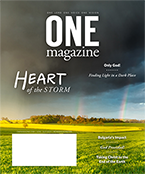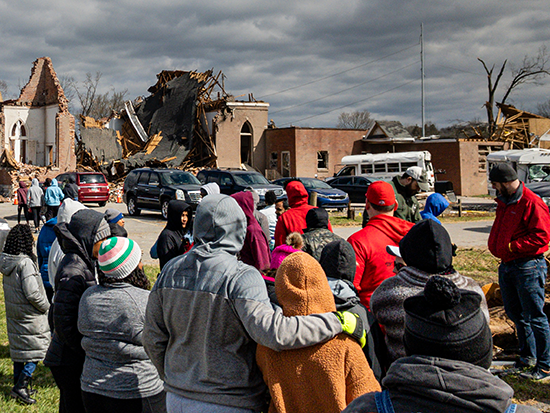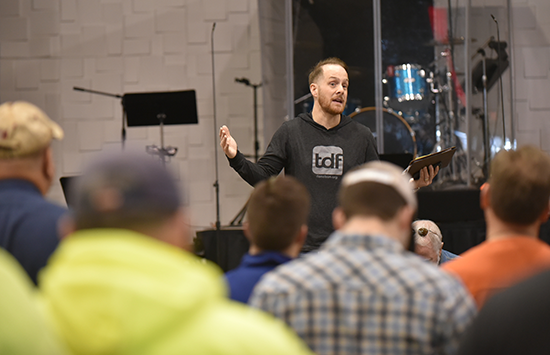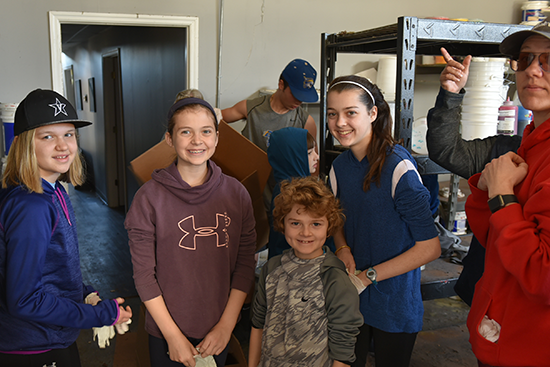
June-July 2020
Heart of the Storm
------------------
|





The HEART of the Storm
By Katy Fry
March 2, 2020, was a monotonous day. I went to work, went home, made supper, watched TV, and went to bed. An average day. I’d only been asleep for an hour when my phone started buzzing insistently, enough to wake me, even though I’m hard of hearing. I tried to make out the message in the blinding light of my screen: a tornado warning had been issued for Davidson County. I threw on my glasses and a pair of shoes and tried to assess the risk. Surely, the tornado wasn’t anywhere near me. Surely, it was a mistake. But I quickly realized the local meteorologists were tweeting in ALL-CAPS, a rare occurrence: Downtown Nashville, Germantown, East Nashville, and my neighborhood—Donelson—needed to take cover immediately.
I took cover in a downstairs bathroom with my roommate, pillow clutched over my head and heart racing as the lights flickered and the wind picked up outside. I was too panicked to pray anything beyond Dear God, please keep us safe. Several minutes passed, ten at the most. We heard the all clear. I returned to bed thankful we had been spared from the storm, but unable to sleep from the adrenaline coursing through my veins.
My phone lit up with texts. I viewed each one with growing disbelief. One friend had the roof ripped off his apartment and barely made it to the safety of his bathroom in time. Another friend and her husband lost their entire house. They had only gone down to their basement because friends were staying over in their camper, and they wanted to make sure they were safe from the storm. Another friend and her husband lost their business, which took a direct hit from what we eventually learned was an EF3 tornado.
Even in the blurry pictures crossing my screen at
2:00 a.m., I could see the damage was extensive, beyond anything I had witnessed in my life. I felt completely helpless, lying safely in my bed while my friends walked through the rubble of their lives. In that moment, all I could do was pray God would give my friends peace and help them sleep.
When morning dawned, I realized just how horrible the damage was. The storm’s path was less than a mile from the townhouse where I live. It was even closer to my church, The Donelson Fellowship. The Lutheran church just down the street was a pile of rubble. The neighborhood behind our church, which I typically drive through multiple times each day, was a tangle of downed trees, powerlines, and the shattered skeletons of houses. The destruction was overwhelming, almost paralyzing. But our church jumped into action: chainsaw teams deployed, AirBnbs secured for those suddenly rendered homeless, bottles of water pouring in. Less than 12 hours after the storm ripped through, we had boots on the ground.

Because The Donelson Fellowship was so close to the storm’s path, Samaritan’s Purse reached out to partner with us. They made many of our volunteer efforts possible. They provided showers for those who lost power (or their entire home), chainsaws and crews to remove the fallen trees and clean-up debris, and a listening ear for those who needed to process the trauma they’d just survived. Free Will Baptist Master’s Men also joined the efforts with teams, chainsaws, and monetary support.
Because of these groups, we made a massive impact on the greater Nashville area, but especially our neighborhood of Donelson.
One beautiful thing about the Nashville community, and especially the Body of Christ, is the spirit of selfless generosity. In the days following the storm, donations flooded in. Water bottles, food, backpacks, flashlights, diapers, toiletries, tarps—anything a storm victim could need. Our worship center began to look less like a place of worship and more like a warehouse. Storm victims could come in and fill a plastic tote with as many supplies as they needed.
It was my job to answer the phone and field the emails and messages coming in over social media. Hunt Brothers Pizza brought a mobile pizza truck and stayed for days, passing out free pizzas to volunteers and victims alike. One of Nashville’s "hot chicken" institutions, Hattie B’s, provided their famous hot chicken. Another restaurant donated many pounds of frozen steak. Corporations, groups, and individuals called, wanting to donate and ready to serve. I have a truckload full of
supplies. I have bottles of water, can I bring them? I live states away. Can I give money? These questions became
a common refrain.

The most unique question I received? I have a ten-pound pork butt I’m about to smoke. Can I bring it by to help feed people? I don’t have much money, but I can do this.
I was reminded of the widow’s mite. Even those who didn’t have much to give were still giving. It didn’t matter that they were struggling too. They simply wanted to give what they could: their time, their talents, and even their food. They gave because it was the right and holy thing to do.
When you think of disaster relief, you probably picture burly men with chainsaws, cutting down fallen trees, or linemen working tirelessly to restore power to affected areas. What you probably don’t picture is the older lady serving food or walking an overwhelmed storm victim through the makeshift aisles of food and cleaning supplies, helping him pick out the best items to take home to his family. You probably don’t picture young children making cards with crayons and scrap paper, to be included in the boxes of resources we distributed to storm victims. These might seem like small acts of service, but they made a huge difference. Chainsaws and crayons are both necessary items in the aftermath of a tornado.
One card in particular made an impact. Samaritan’s Purse was out in a neighborhood, helping a gruff, older man with his roof. They handed him a box of supplies. He was hesitant to accept the resources but carried them inside his scarred home anyway. A few minutes later, he walked out of his house with tears in his eyes, holding the card a child had drawn for him. “Tell her thank you,” he said. Her small act of service helped soften an old man’s heart.
I could share story after story of the lives changed for what seemed the worst, but ultimately for the better. When all was said and done, we served 18,000 meals, distributed 24,000 bottles of water, worked on 356 homes, provide $75,000 worth of supplies and resources, and equipped 3,000 volunteers to go into the community and serve their neighbors. This was possible because of the generosity of those who shared their time, their resources, and their talents.
The most important stat I have to share is this: nine people came to know Jesus Christ as their Lord and Savior during the disaster relief efforts.
I don’t think anyone would have chosen to live through this devastating tornado and its aftermath. But even when the physical world around us seems to be breaking down, God is still working. Even in the destruction, God is there. And now, nine more precious souls get to know and walk with Him. This is the heart of the storm.
The Sunday following the storm, in a worship center filled with supplies and bottles of water, we sang this new but familiar refrain: I will build my life upon Your love. It is a firm foundation. I will put my trust in You alone, and I will not be shaken. Our physical foundations may fail, but our spiritual foundation in Christ never will.
About the Writer: Katy Fry is communications director and receptionist at The Donelson Fellowship near Nashville, Tennessee.

Tornadoes hit home during the early hours of Tuesday, March 3, when a storm bearing as many as four tornados, struck Nashville and the Middle Tennessee area. The tornadoes started just west of Nashville and continued on the ground for over 50 miles before losing their power.
Master’s Men Disaster Response Teams (DRT) quickly
joined local churches and groups to offer relief. The Donelson Fellowship in Nashville was located within blocks of some of the hardest hit areas. While the church sustained no damage other than loss of power, many of the church members and their neighbors were affected. Within 48 hours, Master’s Men DRT began working jointly with the church to offer relief efforts. The response was tremendous. Thousands of volunteers joined the effort during the following days.
In addition to local volunteers, Master’s Men partners from several states offered their assistance. Master’s Men offers thanks to Kevin Woolbright and the Illinois Master’s Men Disaster Response Team for coming and bringing some heavy equipment.
A little farther east, the Cookeville FWB Church served their community during this time with the help of the South Carolina, Florida, and Kentucky DRTs. Thanks to coordinators Chris Todd (SC), Allen Austin (FL), and Kevin Flannigan (KY). Master’s Men also thanks DRT coordinators from Alabama and Mississippi for offering to bring their equipment to help.
In the last 15 years, I have served all across our country during times of natural disasters, but I have never seen the turnout like we experienced in Middle Tennessee.
Maybe that’s why it’s called the Volunteer State.
—Ken Akers, Director, Master’s Men

|
|

